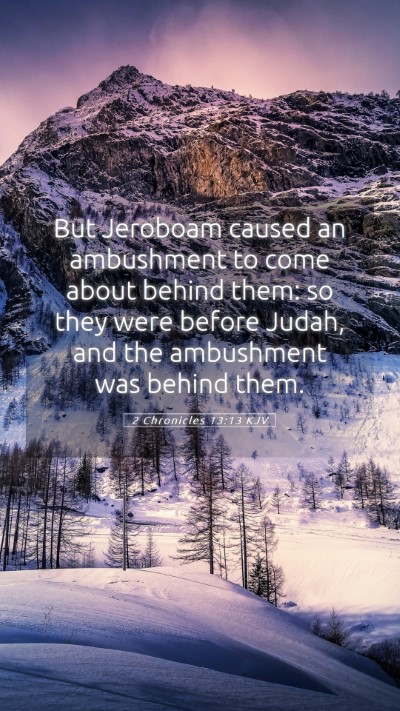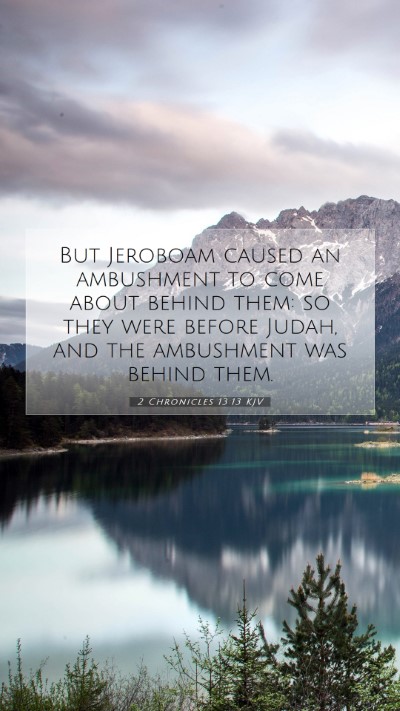Understanding 2 Chronicles 13:13
Bible Verse: 2 Chronicles 13:13 - "But Jeroboam caused an ambushment to come about behind them: so they were before Judah, and the ambushment was behind them."
Meaning of This Verse: This verse captures a critical moment in the conflict between the northern kingdom of Israel, led by Jeroboam, and the southern kingdom of Judah, under King Abijah. Jeroboam's strategic tactic of creating an ambush demonstrates his cunning and the escalating tension between the two kingdoms.
Bible Verse Meanings and Interpretations
This event illustrates several key themes within biblical scripture:
- Divine Sovereignty: The passage highlights God's control over the affairs of nations and leaders. Despite Jeroboam's plans, God's purposes ultimately prevail.
- Human Conflict: The conflict between Judah and Israel is indicative of a broader theme of political and spiritual strife within the biblical narrative, which serves as a lesson on the consequences of disobedience to God's commandments.
- Strategy and Deception: Jeroboam's ambush reflects the human reliance on cunning strategies over faith. This serves as a reminder of the need for reliance on divine guidance in our endeavors.
Historical Context of the Verse
The split between the northern and southern kingdoms had significant implications for Israel’s history. Following Solomon's reign, Jeroboam led a revolt against Rehoboam, resulting in a divided monarchy. Understanding this historical background enhances our Bible study insights.
Commentary Insights
Matthew Henry: Henry emphasizes the complexity of human motives as Jeroboam employs cunning tactics. He points out that the ambush depicts a lack of faith in God’s promises for protection and victory.
Albert Barnes: Barnes interprets the ambush as a manifestation of Jeroboam's strategic prowess. Yet, he also notes the ultimate futility of such strategies when opposed to divine will.
Adam Clarke: Clarke discusses the spiritual implications of this battle, asserting that reliance on military tactics over faith could lead to downfall. He encourages readers to reflect on their own approaches in conflict situations.
Application of This Verse in Daily Life
This verse invites readers to consider how they approach challenges and conflicts in their lives:
- Faith over Strategy: Trusting in God’s guidance rather than solely relying on our cunning plans can lead to true success.
- Awareness of Spiritual Battles: Recognizing that our conflicts often have spiritual dimensions encourages us to seek godly wisdom.
- Reflect on Division: The division between Jeroboam and Rehoboam serves as a warning against strife and disunity within communities and even within personal relationships.
Bible Cross References
To further understand the significance of 2 Chronicles 13:13, consider the following related passages:
- 1 Kings 12:16-20 - The context of the division of the kingdom.
- 2 Chronicles 14:9-15 - A subsequent battle during King Asa’s reign that also reflects reliance on God.
- 1 Kings 15:9-13 - The conflict between the kings of Judah and Israel continuing the narratives of divine judgment and human action.
Conclusion
2 Chronicles 13:13 serves as a poignant reminder of the interplay between human actions and divine sovereignty. In studying this passage, Christians can gain profound insights into how to navigate their own conflicts with faith and strategic wisdom. This verse invites deep Biblical exegesis and practical applications for our lives today.


